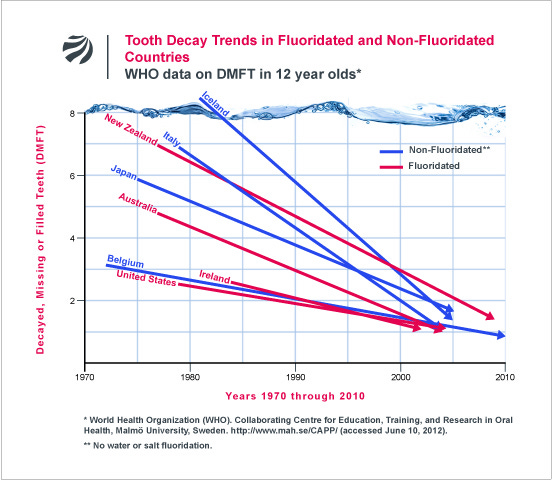For decades, any person who expressed concern about possible adverse health consequences of fluoridated water was derided as the epitome of the tinfoil hat-wearing nutter.
However, in recent years, evidence that drinking fluoridated water is harmful to the developing human brain has now accumulated to the point where scientists are defying the groupthink and openly calling for reconsideration of water fluoridation.
The National Health and Medical Research Council here in Australia insists that "there is no reliable evidence of an association between community water fluoridation at current Australian levels and any health problems", and specifically denies any connection with "lowered intelligence".
This assertion is flatly contradicted by a comprehensive review of the neurodevelopmental and cognitive health effects of fluoride exposure conducted by the US National Toxicology Program (NTP), which concluded that "fluoride is presumed to be a cognitive neurodevelopmental hazard to humans" [emphasis theirs].
It has long been known that fluoride readily crosses the placenta, that the developing brain is more susceptible to injury by neurotoxins than the mature brain, and that such injury can cause permanent damage. Reduced IQ is the most well-documented form of this fluoride-induced brain damage.
The NHMRC defines a range of 0.6 to 1.1 milligrams of fluoride per litre of drinking water (mg/L) as optimal for dental health. However, in a systematic review and meta-analysis of fluoride exposure and delayed neurobehavioral development, three of the included studies found that children who were exposed to levels of fluoride that are within the range that NHMRC considers safe had lower IQs than children with lower exposure to fluoride:
Children exposed to 0.88 mg/L of fluoride in drinking water had lower IQ scores compared with children exposed to 0.34 mg/L.
Children exposed to >1.0–8.6 mg/L had a lower IQ than those exposed to 0.58–1.0 mg/L.
Children exposed to 0.57–4.5 mg/L had lower IQs than those exposed to 0.18–0.76 mg/L.
It's clear from these studies that the lower the level of fluoride in drinking water that developing foetuses and children are exposed to, the better for their brains.
Evidence from high-quality studies shows that children who were exposed to higher amounts of fluoride during early brain development scored about 3 to 7 points lower on their IQ tests.
Formula-fed infants whose formula is reconstituted with fluoridated water are at particularly high risk as formula is their sole source of food for the first 4-6 months of life; breast milk contains little fluoride. After controlling for foetal fluoride exposure, the researchers found that "a 0.5 mg increase in fluoride intake from infant formula corresponded to an 8.8-point decrement in Performance IQ" assessed at age 3-4.
IQ loss has been observed even at levels of fluoride exposure that are well within the range recommended by NHMRC. A drop of just 1 IQ point has been calculated to result in a 2% reduction in lifetime economic productivity (equivalent to roughly US$20,000), and while this difference may be imperceptible to the individual, the societal costs are significant.
Higher rates of attention-deficit hyperactivity disorder (ADHD) have been observed in children and adolescents who live in areas with fluoridated water.
There is broad agreement that the dental benefits of fluoride are strictly topical. No additional benefits are gained from swallowing fluoride (which has no nutritional benefits, and is used a pesticide for killing cockroaches) as fluoride incorporated during tooth development is insufficient to play a significant role in prevention of tooth decay.
It is noteworthy that rates of tooth decay have fallen at about the same rate in countries which do and do not add fluoride to drinking water:
Furthermore, in countries that formerly added fluoride to the water supply, but subsequently reversed the practice, tooth decay rates either did not change, or actually decreased after fluoridation ceased.
The addition of fluoride to drinking water art current levels poses an unacceptable risk to children's neurodevelopment. Pregnant women and parents of children who wish to avoid the harmful effects of fluoride on their children's brain development should invest in a specialised water filter designed to remove fluoride from drinking water. Other adults who recognise the absence of benefits of ingested fluoride may also choose to do so. Topical application of fluoride to the teeth should be discussed with your dentist.





Former Qld. premier Anna Bligh before she left gifted us with fluoridation in the water supply; some towns had time to opt out; but, now apparently all have to opt in to get their dose. A better option would have been be to have parents provide proper nutrition for their children and teach them to brush their teeth rather than medicalising the whole population.
Re the NH&MRC (3rd paragraph from top) - they insist that there's no reliable evidence at current Australian levels. Does that mean that they know there is at different levels? To me, their statement is not conclusive.